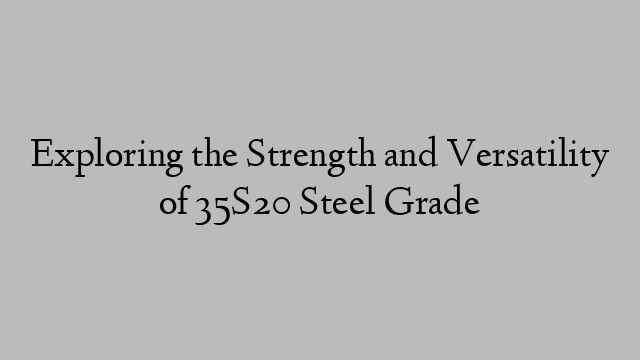Address
304 North Cardinal St.
Dorchester Center, MA 02124
Work Hours
Monday to Friday: 7AM - 7PM
Weekend: 10AM - 5PM
Address
304 North Cardinal St.
Dorchester Center, MA 02124
Work Hours
Monday to Friday: 7AM - 7PM
Weekend: 10AM - 5PM

Material Specification: Exploring the Strength and Versatility of 35S20 Steel Grade
Introduction:
The 35S20 steel grade is a commonly used alloy steel known for its excellent strength and versatility. This material is widely utilized in various industries, including automotive, machinery, and construction. In this specification, we will explore the mechanical properties and chemical composition of 35S20 steel grade to understand its strengths and applications.
Mechanical Properties:
1. Tensile Strength: The tensile strength of 35S20 steel grade is typically in the range of 850-1000 MPa. This high tensile strength makes it suitable for applications requiring strong and durable components.
2. Yield Strength: The yield strength of 35S20 steel grade is approximately 700-900 MPa. This indicates the point at which the material begins to deform permanently under a specified load. It ensures that the material can withstand significant stress without permanent distortion.
3. Elongation: The elongation of 35S20 steel grade is typically around 10-15%. This property measures the material’s ability to undergo plastic deformation before fracture. Higher elongation values signify better ductility.
4. Hardness: 35S20 steel grade usually has a hardness of around 200-250 HB. This hardness level allows it to resist wear, abrasion, and deformation, making it suitable for applications where hardness is crucial.
Chemical Composition:
The chemical composition of 35S20 steel grade typically consists of the following elements:
1. Carbon (C): The carbon content in 35S20 steel grade is around 0.32-0.40%. Carbon enhances the material’s strength and hardness while maintaining good machinability.
2. Manganese (Mn): The manganese content in 35S20 steel grade ranges from 1.40-1.70%. Manganese improves the material’s hardenability and tensile strength.
3. Silicon (Si): Silicon content in 35S20 steel grade is around 0.15-0.35%. Silicon enhances the material’s strength, hardness, and resistance to oxidation.
4. Phosphorus (P): The phosphorus content in 35S20 steel grade is typically limited to a maximum of 0.040%. Phosphorus improves the material’s machinability but may reduce its ductility and toughness if present in excessive amounts.
5. Sulphur (S): The sulphur content in 35S20 steel grade is usually limited to a maximum of 0.070%. Sulphur improves the material’s machinability but may reduce its ductility and toughness if present in excessive amounts.
Conclusion:
The 35S20 steel grade demonstrates excellent strength and versatility due to its mechanical properties and chemical composition. Its high tensile and yield strengths, combined with good elongation and hardness, make it suitable for a wide range of applications, including components subjected to high stress, wear, and abrasion. Understanding the specifications of 35S20 steel grade can help in selecting the appropriate material for specific engineering requirements.
35S20 Steel grade
1698389348